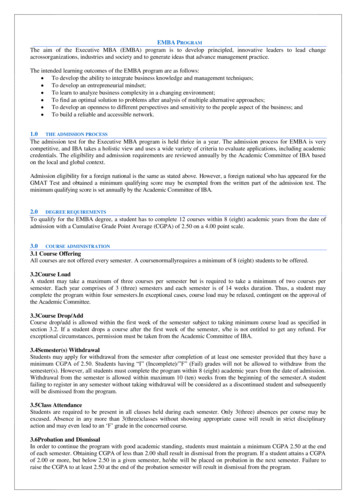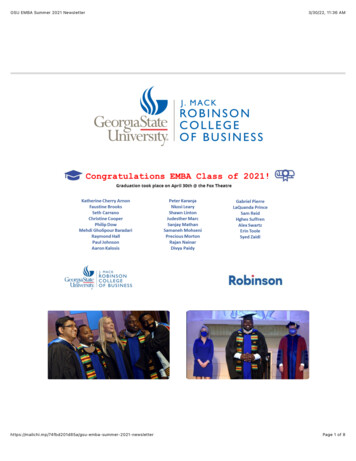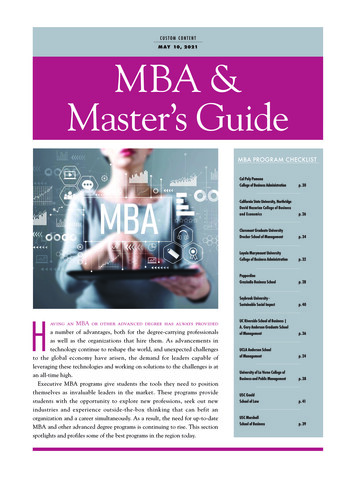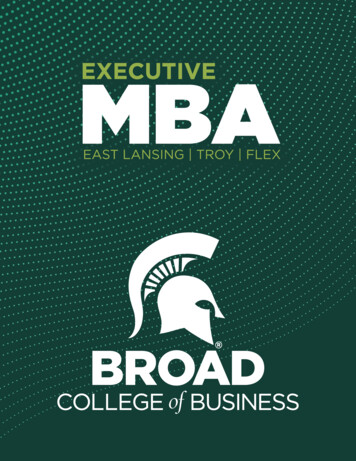
Transcription
EMBA PROGRAMThe aim of the Executive MBA (EMBA) program is to develop principled, innovative leaders to lead changeacrossorganizations, industries and society and to generate ideas that advance management practice.The intended learning outcomes of the EMBA program are as follows: To develop the ability to integrate business knowledge and management techniques; To develop an entrepreneurial mindset; To learn to analyze business complexity in a changing environment; To find an optimal solution to problems after analysis of multiple alternative approaches; To develop an openness to different perspectives and sensitivity to the people aspect of the business; and To build a reliable and accessible network.1.0 THE ADMISSION PROCESSThe admission test for the Executive MBA program is held thrice in a year. The admission process for EMBA is verycompetitive, and IBA takes a holistic view and uses a wide variety of criteria to evaluate applications, including academiccredentials. The eligibility and admission requirements are reviewed annually by the Academic Committee of IBA basedon the local and global context.Admission eligibility for a foreign national is the same as stated above. However, a foreign national who has appeared for theGMAT Test and obtained a minimum qualifying score may be exempted from the written part of the admission test. Theminimum qualifying score is set annually by the Academic Committee of IBA.2.0 DEGREE REQUIREMENTSTo qualify for the EMBA degree, a student has to complete 12 courses within 8 (eight) academic years from the date ofadmission with a Cumulative Grade Point Average (CGPA) of 2.50 on a 4.00 point scale.3.0 COURSE ADMINISTRATION3.1 Course OfferingAll courses are not offered every semester. A coursenormallyrequires a minimum of 8 (eight) students to be offered.3.2Course LoadA student may take a maximum of three courses per semester but is required to take a minimum of two courses persemester. Each year comprises of 3 (three) semesters and each semester is of 14 weeks duration. Thus, a student maycomplete the program within four semesters.In exceptional cases, course load may be relaxed, contingent on the approval ofthe Academic Committee.3.3Course Drop/AddCourse drop/add is allowed within the first week of the semester subject to taking minimum course load as specified insection 3.2. If a student drops a course after the first week of the semester, s/he is not entitled to get any refund. Forexceptional circumstances, permission must be taken from the Academic Committee of IBA.3.4Semester(s) WithdrawalStudents may apply for withdrawal from the semester after completion of at least one semester provided that they have aminimum CGPA of 2.50. Students having “I” (Incomplete)/”F” (Fail) grades will not be allowed to withdraw from thesemester(s). However, all students must complete the program within 8 (eight) academic years from the date of admission.Withdrawal from the semester is allowed within maximum 10 (ten) weeks from the beginning of the semester.A studentfailing to register in any semester without taking withdrawal will be considered as a discontinued student and subsequentlywill be dismissed from the program.3.5Class AttendanceStudents are required to be present in all classes held during each semester. Only 3(three) absences per course may beexcused. Absence in any more than 3(three)classes without showing appropriate cause will result in strict disciplinaryaction and may even lead to an „F‟ grade in the concerned course.3.6Probation and DismissalIn order to continue the program with good academic standing, students must maintain a minimum CGPA 2.50 at the endof each semester. Obtaining CGPA of less than 2.00 shall result in dismissal from the program. If a student attains a CGPAof 2.00 or more, but below 2.50 in a given semester, he/she will be placed on probation in the next semester. Failure toraise the CGPA to at least 2.50 at the end of the probation semester will result in dismissal from the program.
3.7 Unfair MeansStudents are strictly forbiddento adopt unfair means. The following shall be considered as the adoption of unfair means: Communicating with fellow students for obtaining help, except in the case of collaborative work; Copying from another student's script, report, paper, etc. or helping another student to do the same; Copying from printed matter, hand-written script, writing on desk or palm, or from other incriminatingdocuments during quizzes or examinations; Plagiarising or copying from existing work without reference for inclusion in any submitted work; Possession of any incriminating document/mobile phone/electronic device including smartwatches with storagecapacity, whether used or not; and, Any approach in direct or indirect form to influence a teacher concerning grades.Students adopting unfair means may be given an 'F' grade for the concerned assignment, test, quiz, paper, report, or evenfor the entire course, at the discretion of the instructor. Also, the adoption of unfair means and engaging in any behaviour,which disrupts the academic atmosphere and violates the tenet of respect towards other members of the Institute,will bedealt withstrictly. Disciplinary action may include dismissal of the student from the program as well as expulsion fromIBA and as such, the University of Dhaka. Detailed consequences of such unfair means are outlined in a separate documenttitled „Handbook of Code of Conduct‟.4.0 PERFORMANCE EVALUATIONThe continuous performance evaluation system is followed at IBA. Students are given continuous feedback throughout thesemester using various performance evaluation tools including class performance, quizzes, exams, assignments,presentations etc.4.1Grading SystemIn each course, students receive letter grades such as „A‟, „A-‟, „B ‟, „B‟, „B-‟, „C ‟, „C‟, „C-‟, „D ‟, „D‟, and „F‟,depending on their performances. 'F' is a failing grade. „I‟ stands for an incomplete grade. An incomplete grade may beawarded if a student fails to complete all the requirements of a course due to circumstances deemed appropriate by thefaculty member (e.g. health issues). „I‟ grades are always accompanied by an alternative grade. Students must contactconcerned faculty members to clear „I‟ grades. All „I‟ grades must be replaced by other grades within four weeks of gradesubmission date. If no replacement grade is submitted within the stipulated period, the alternategrade accompanied with the„I‟ grade will become officially accepted. The numerical equivalence (grade point) of each grade, as used in calculatingCGPA, is as follows:Letter GradesAA-Grade Points4.003.67Letter GradesCC-Grade Points2.001.67B 3.33D 1.33B3.00D1.00BC 2.672.33FI0.00NA5.0 CURRICULUMThe variety of coursework in the EMBA curriculum contributes to a broad-based understanding of business managementprocesses. The pedagogy followed is a mix of a case study and real-life project-based learning along with theoretical andconceptual knowledge. The students are required to work on projects or relevant case studies from the beginning of thesemester and relate theoretical knowledge with practical situations.5.1Course StructureCourse CategoryCoreFree ElectiveCapstoneNo. of Courses921TotalCredit Per Course3332Total Credits276336
5.1.1 Core CoursesSerial No.123456789Course CodeC501K501W501H501A501E501P501F501M501Course TitleManagerial CommunicationQuantitative Analysis for Business DecisionsManagement of OrganizationsManaging Human Resource For ExcellenceAccounting for Managerial DecisionsManagerial EconomicsManaging Operations and Supply ChainFinancial Theory and PracticeMarketing Theory and PracticePrerequisiteW501K501K501A501W5015.1.2Free Elective CoursesStudents must take two free elective courses from the following courses in their last semester along with the capstonecourse. Students are allowed to take free elective courses only after the completion of all core courses.Serial No.12Course 1W602W603Course TitleCorporate FinanceInvestment Analysis and PortfolioManagementNegotiation and Conflict ManagementBusiness AnalyticsProject ManagementBuyer BehaviorBrand StrategyBusiness ResearchCorporate Governance and BusinessEthicsLeadership and Change ManagementInnovation and Entrepreneurship5.1.3Capstone CourseStudents must take the capstone course in their last semester after completing all core courses. The capstone course isdesigned to tie together the key learning objectives of relevant management courses and test the students‟ ability tosynthesise and demonstrate what they have learned in their previous classes.Course CodeW650Course TitleBusiness Strategy in a CompetitiveEnvironmentPrerequisiteAll core courses5.1.4 Additional CourseStudents can take up to 3 additional courses from the list of free elective courses, in addition to the 12 courses required forcompletion of the EMBA Program. Additional courses can be taken only if they are being offered. Students will have topay extra fees for taking additional courses. The grade earned in the additional courses will be reflected on the transcript;however, they will not be considered in the calculation of the Cumulative Grade Point Average (CGPA).3
CORE COURSESC501 Managerial CommunicationThis course explores the critical roles that communication plays in managers/leaders being effective in their tasks as theyexchange meaning with supervisees, peers, supervisors, the larger organisation, and the community. Both formal andinformal communication will be addressed. Additionally, issues such as cross-cultural communication, ethics, conflictresolution, crisis communication, and developing organisational communication competencies will be investigated.Emphasiswill be placed on developing skills critical to career advancement and necessary for effective organisationalfunctioning.K501 Quantitative Analysis for Business DecisionsThis course introduces the concepts of quantitative business analysis to help the participants gain a clear understanding ofthe key elements in the managerial decision-making process. The course will discuss methods that are used extensively inbusiness organisations. Topics covered include elements of algebra, number fields, linear and non-linear inequalities,functions sets, analytical geometry, logarithm limit, differential and integral calculus, matrix and linear programming,statistics, probability distributions and theories.W501 Management of OrganizationsThis course will familiarize students to management theory and practice. The course provides students with theopportunityto enhance their understanding of organizations where they may have seen a functionconcerning the evolution ofmanagement theories over the past hundred years. By the end of the course, students should have an improvedunderstanding of what managers do, how and why organizations are structured differently, and some of the implications ofand reasons for these differences. The course focuses on the management functions of planning, organizing andcontrolling. The course will have a focus on knowing (theory), doing (application) and being (self-reflection). The lecturesare supplemented with cases to make them more useful.H501 Managing Human Resource for ExcellenceThis course is designed to introduce the participants to some of the key ideas, issues and debates about management andmanaging others within an organization. This course deals with the management of human resources in an organization,viz, the basic functions of human resource management, sources of personnel, methods of selection, recruitment,developing and motivating the workforce, procedures of primary record-keeping, compensation, salary and wageadministration, promotion, training appraisal, health safety, moral discipline, employee benefits etc.A501 Accounting for Managerial DecisionsThe course aims to provide students with in-depth knowledge of the concepts, tools and techniques of accounting formanagerial decisions and impart them with skills of their practical applications for strategic decision making, planning, andcontrolling process. It covers the fundamental concepts, tools and techniques of managerial and financial accounting.Financial accounting part includes undertaking the basics equation, recording process and preparation of different financialstatement and analysis of financial statements. Management accounting part includes various cost concepts, variablecosting and absorption costing, cost volume profit analysis, budgeting, variance analysis, segment reporting, transferpricing, relevant cost information in decision making etc.E501 Managerial EconomicsThe course will teach students the application of economic theory to managerial decision-making problems. Students willdevelop an understanding ofdecision-making under uncertainty, attitudes towards risk and the value of information. Theywill be taught game theory and strategic decision-making, including its applications to oligopoly, collusion among firms,product differentiation, entry deterrence and other market practices. Topics include an overview of managerial economics;demand and supply; costs of production and the organization of the firm; market structure and pricing and outputdecisions; game theory and pricing strategies; and the economics of information and the role of government in themarketplace. The emphasis of this course is on the use of economic reasoning to solve actual business decision problems.P501Managing Operations and Supply ChainThis course is an introduction to the concepts, principles, problems, and practices of operations and supply chainmanagement. Emphasis is on managerial processes for effective operations in both goods-producing and service-renderingorganization. Topics include operations strategy, process design, capacity planning, facilities location and design,forecasting, production scheduling, inventory control, quality assurance, and project management. This course alsoexamines the role of logistics in the supply chain within a focal firm as well as between organizations linked within a givensupply network. Topics cover issues such as terms of logistics, distribution and transportation alternatives, the connectionbetween logistics and marketing, the estimation of value and costs in logistics, sourcing and supply management, supplychain planning and control strategies and future challenges and opportunities in logistics. This course also surveys researchmodels for operations and techniques developed for a variety of problems that arise in the logistical planning of productionsystems.4
F501 Financial Theory and PracticeThis course covers the basic principles of financial management. This course introduces a set of concepts and analyticaltechniques required by a financial manager about capital budgeting and financing decision making. Topics covered includethe time value of money concept, valuation of principal financial instruments, capital budgeting decisions, measurement ofrisk and return, short-term financial planning, working capital management, financing decisions and calculation of the costof capital etc. The primary goal of finance is to maximize shareholders‟ wealth. This course helps students understand howthe financial manager of an organization can achieve such goal. This course also relates these theories to real-life examplesand cases.M501 Marketing Theory and PracticeThis course is designed to guide students through the fundamental concepts of marketing, and how they are applied inpractice. In particular, it aims to provide students with theoretical and practical knowledge of fundamental marketingtheories, concepts and analytical tools. It also explores the central tasks of marketing management and introduces studentsto key marketing tools, such as the elements of the marketing mix. Furthermore, it also provides an insight into theinterrelationship between marketing and other disciplines. The course will provide students with an overview of marketing,emphasizing customer satisfaction and value; product, price, promotion, place, people and physical evidence of quality;consumer behaviour; marketing research; segmentation-targeting-positioning; ethical, global, and social issues. Themodule makes use of case studies to explore fundamental, analytical marketing tools and their application to the marketingdecision-making process.ELECTIVE COURSESF601 Corporate FinanceThis course covers advanced theoretical and applied issues in financial management. This course provides a rigorousanalytical approach for managerial decision making to enhancethe firm‟s long-term value. This course extensively utilisescase materials related to valuations of start-ups, investment decisions, financial restructuring, mergers and acquisitions, andprivate equity/leveraged buyouts – to understand the real-world applications of corporate finance. Firms‟ policies related tocapital structure and dividend payment will also be covered in this course. This course aims to provide cutting edgeknowledge in the frontiers of finance using the latest pedagogy to develop brilliant finance minds. By the end of the course,students will be comfortable working with theoretical models of corporate finance and be able to apply these tools toperform financial analysis in real-life situations.F602 Investment Analysis and Portfolio ManagementThe objective of the course is to help students understand the investment setting, appreciate the available investmentvehicles, analyze securities for investment, create and manage portfolios and evaluate portfolio performance. The coursecontent includes investment environment, investment management processes, security analysis techniques, andtheories ofportfolio formation, investment strategies, and portfolio management and performance evaluation techniques. Discussionabout the behavioural aspects of investment decision-making and prospects of investing in options and other derivativeswill also be covered.H601 Negotiation and Conflict ManagementThis course aims at providing a systematic introduction of concepts, theories and practices, with afocus on equippingstudents with toolkits for handling conflict and negotiation. The course content is composed of two intimately related parts.The beginning part introduces the nature and types ofconflict, mechanism of conflict escalation and de-escalation, andconflict resolution styles. The rest of the sessions discuss various negotiation strategies. Specifically, students will learnstrategies to avoid cognitive biases in negotiation, the building blocks of negotiation, the differences of distributive versusvalue-creating negotiation approaches, the strategies of achieving integrative outcomes, building trust and controllingemotions, utilizing power and persuasion, and negotiation ethics. Some topics may also be covered in the context of crosscultural negotiation to cater to the need of today‟s international business environment.K601 Business AnalyticsThis course analyzeskey issues related to the design and management of operations and supply chains using quantitativetools such as linear, integer, and non-linear programming, regression, and statistical analysis. This course also coversimportant topics such as forecasting, aggregate planning, inventory theory, transportation, risk pooling, production controland scheduling, and facilities location, among others. In this course, students will learn to identify, evaluate, and capturebusiness analytic opportunities that create value in operations of any organization. In the first part of the course, the focuswill be on how to use data to develop insights and predictive capabilities using machine learning, data mining andforecasting techniques. In the second part, the focus will be on the use of optimization to support decision-making in thepresence of a large number of alternatives and business constraints. Finally, throughout the course, it will explore thechallenges that can arise in implementing analytical approaches within an organization.5
K602 Project ManagementThis course provides a systematic and thorough introduction to all aspects of project management. Therefore, the courseunderlines the importance of understanding the relationship between projects and the strategic goals of the organization.The course also discusses the technical, cultural, and interpersonal skills necessary to successfully manage projects fromstart to finish. The course deals with project identification, preparation, appraisal, management of implementation andpost-project evaluation. Basic techniques like network analysis, organizing and control aspects of project implementationin relation to resources, time scale and information processing are emphasized. Feasibility study of a business project is amajor part of the course. This course will acquaint the students with latest available project management software.Conceptsarereinforced by case studies covering a wide variety of project types and industries.M601 Buyer BehaviorThis course is based on theories developed in psychology and builds a bridge to marketing. The conceptual framework ofthe course breaks the causes of behavior up into types of psychological responses (i.e., mental mechanisms), such as,perceiving, reasoning, feeling, learning, or remembering. These psychological responses intervene between the marketingmix (input) and the behavior of consumers, such as purchase or usage (output). The psychologicalresponses hence providea framework as to why certain marketing inputs lead to certain outputs, that is, a framework to derive strategically relevantconsumer insights. The course also reviews a range of simple but powerful “levers” (inputs) that can influence consumerbehavior in unexpected ways.M602 Brand StrategyIn this course, students examine how a favorable brand and memorable brand experiences can influence a firm‟s ability towithstand competitive pressures and thrive in dynamic market conditions. They will study brand management from theconsumer perspective to highlight the importance of customer perceptions in bringing brands to life and the role of brandknowledge in building brand equity. Students will become acquainted with cutting-edge frameworks, concepts and toolsthat have been adopted across industries and around the globe to build lucrative brand franchises. Additionally, studentswill consider the role of marketing communication vehicles and platforms in effective brand management.R601 Business ResearchThis course is designed to provide students with the necessary skills and knowledge to determine the information necessaryto address an identified research problem (basic or applied) and, using this understanding, develop and use an actionableresearch proposal. In this process, the students will gain an understanding of relevant approaches and elements ofundertaking a research enquiry specifically to provide insights to solving a relevant problem. They will develop criticalcore competencies and skills required to carry out such an enquiry. These competencies and skills include: definingresearch questions; setting appropriate research objectives; studying design that incorporates research objectives andbudgetary constraints; secondary and primary data collection and instruments; sampling and analysis methods; andeffective reporting of results; as well as understanding the importance of ethical conduct in conducting research in both adomestic and in international business contexts.W601 Corporate Governance and Business EthicsThis course is focused on helping students understand the roleboards and board members play in corporate governance.Topics include corporate governance framework & structure, different models of corporate governance, variousunderpinning theories relating to corporate governance, roles and functions of the board of directors, role of independentdirectors and local and international corporate governance guidelines as has been developed in the recent period withemphasis on the responsibilities of the owners and managers, the role of the various subcommittees i.e. audit committee,nomination committee, remuneration committee, risk management committee etc. Recent developments in corporategovernance and its codes along with corporate failure due to lack of corporate governance will also be discussed in thiscourse. Proper financial reporting and disclosure system necessary for good corporate governance are also covered in thiscourse. Ethical consideration in managing a business is also an important element of this course.W602 Leadership and Change ManagementThis course is designed to help the students gain personal insights into leadership styles and learn the tools and techniquesrequired to become an inspiring leader. It is meant for those who wish to better understand and further develop theirpotential and inclination to lead others. The course is based on the premise that leadership is not a genetic inheritance. It‟sa skill to acquire and master. This course will provide students with a framework for that skill and an outline for thatjourney. This course will help the students hone some of the essential self-reflective skills they need in order to give formand substance to such a vision.W603 Innovation and EntrepreneurshipThe course focuses on understanding and managing creativity and innovation in organizations by examining therelationships among organizational structure, group dynamics and individual psychology in problem-solving organizations.While this course primarily draws examples from the contexts of new product development, entrepreneurship, marketingand knowledge management the insights generatedapply to all disciplines and organizations facing the problem of routine6
innovation and change. Also, this course helps students develop a conceptual framework and an understanding of the bestpractices related to developing, executing, and managing large and small scale innovation initiatives in the organization.CAPSTONE COURSEW650 Business Strategy in a Competitive EnvironmentThe course will introduce concept and frameworks that are rooted in the theory of strategy and management, which haveproved valuable in practice. This course includes a study of strategic planning including mission statement development,analysis of the external environment and internal organizational factors, development of strategic alternatives, selection ofappropriate alternatives, implementation of strategies, and competitive strategiesand dynamics. Special emphases are givento the integration and coordination of the functional areas within the enterprise. The course will also discuss whatmanagers often describe as their greatest challenge – implementing the strategy. It will focus on the thinking, skills andactions required of manager for the development, communication and implementation of strategic organizational choicestowards organizational success. The case method will be used to provide practical experience in analysis and decisionmaking in the solution of business problems.DisclaimerInstitute of Business Administration and the University of Dhaka reserve the right to incorporate, change,modify and delete any contents laid down in this brochure. Such content may include, among other things, rulesand regulations governing the EMBA program of IBA, course offerings, and course descriptions.7
The aim of the Executive MBA (EMBA) program is to develop principled, innovative leaders to lead change acrossorganizations, industries and society and to generate ideas that advance management practice. The intended learning outcomes of the EMBA program are as follows: To develop the ability to integrate business knowledge and management .










